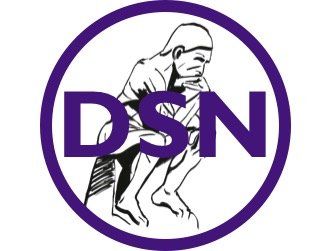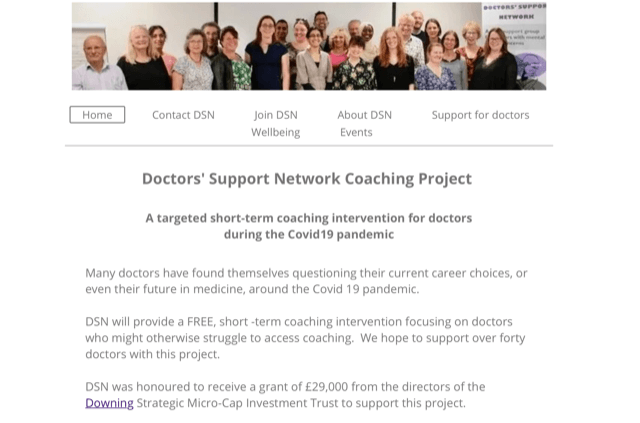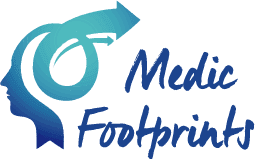Professional support
DSN coaching project launched May 2021
Find out more including how to access up to five hours of FREE coaching HERE
Careers and coaching
Doctors and medical students with mental health problems often query their choice of career or speciality during their illness or afterwards. Apart from friends and colleagues, there are individuals and companies specialising in career guidance for doctors. Some of these are listed below.
DSN has not assessed the quality of these services and if you choose to use any of them, it will be your own responsibility.
Career Support

Coaching for doctors
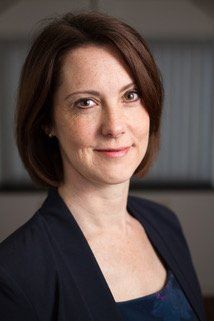
Fiona Day Consulting empowers doctors and professionals to transform their working lives using evidence based psychological theory and behaviour change science.
Fiona is a former Consultant in Public Health Medicine and Occupational Physician with 25 years’ experience in wellbeing and resilience who is independently accredited by the European Mentoring & Coaching Council (EMCC) as a Master Practitioner Coach and Mentor. Fiona has worked with over 160 senior doctors and public health leaders in the last six years.
Read on to find out why Fiona thinks every doctor would benefit from working with an Executive Coach and how to choose the right coach for you.
5 reasons why every Doctor should work with an Executive Coach to improve their working lives and careers
The ‘how to guide’ to choosing an Executive Career Coach
Doctors are under a lot of pressure, from stepping into system leadership roles, managing demand, expectations and complexity, funding issues... the list of challenges continues to grow. Executive Coaching provides an evidence based alternative to counselling for doctors wanting to make changes in their working lives and careers around topics such as wellbeing, career planning and leadership skills development.
I see a lot of doctors as coaching clients who feel their working lives have got out of balance and are feeling on the edge, are recovering from an episode of burnout or ill health, or who wonder 'is this it?', 'have I made the right career choices?'. We work together to understand their own deeply held values and motivators, their needs, their basic personality traits, and use cutting edge behaviour change theory to develop plans and actions to begin to transform their careers. Finding meaning and satisfaction in the workplace really matters to most doctors and taking action to (re)create vitality and wellbeing at work is entirely possible.
1. Help you to understand yourself and your context
‘We know how we feel when we hear ourselves speak’ is an old counselling adage and a skilled Executive Coach will be able to help you to understand yourself, what is happening in your career and work life at the moment, and why you might be feeling under pressure, having difficult relationships at work or at home, why you might be feeling overwhelmed or in a downward spiral. For those in leadership roles, the Executive Coach will help you understand what clinical leadership is, and what kind of leader you want to be. Understanding the present situation is a first step in gaining insight into what needs to change in the future.
2. Help you to clarify what you want the future to look like and how you are going to get there
Executive Coaching is future focused, that is to say it is about what you want and how you are going to get more of what you want in your life generally as well as your career. This is very much dependent on each person individually, but for many doctors they want a better work-life balance, better relationships at work, greater wellbeing, sense of meaning and purpose, or new skills to stretch themselves in clinical leadership roles. The Executive Coach will work with you to be really clear what you want in the future and will help you to identify the steps you need to take to get more of what you want, starting immediately.
3. Support you to develop new skills and approaches to implement the changes you wish to see to build your resilience
If making changes in our working lives was easy, we’d have done them already! Making change is actually very difficult, it may involve stepping out of learned ways of behaving, communicating our needs clearly and seeing if they are reasonably met by others, and continuing in the direction of travel even when things get difficult. An Executive Coach will ‘be on your own side’ walking every step of the way with you and helping you to overcome obstacles (real or perceived) to help you fulfil your potential and have a career which better suits your needs. For example I teach basic mindfulness skills which transforms doctors’ abilities to notice their thoughts and emotions on a moment by moment basis and also to be able to take effective action in line with what deeply matters to them in the face of difficulty and set backs.
4. Help you to draw out your own learning through reflection and experimentation with new ways of thinking and behaving
Making changes at work and in our careers means we have to step out of our comfort zone, and can mean experiencing short term pain for longer term gain. Cultivating a ‘beginner’s mind’ and a willingness to experiment with new ways of thinking and behaving are necessary skills and an Executive Coach will help you to draw out your own learning and insights throughout the Coaching relationship.
5. Challenge your thinking where necessary in a supportive and helpful way
Human beings are not skilled at giving feedback generally, we avoid conflict and international research has found that giving feedback is an area which most managers say they dread, which is reflected in most people’s experience of receiving such feedback! Executive Coaches are trained to challenge their client’s thinking in a supportive and helpful way and the Coach can often be the only person a client feels they can truly depend upon to give them balanced and unbiased feedback. Coaching is a relationship of equals, we are all ‘climbing our own mountains’, and the Coach can often see what is ahead of you on your own mountain in a way which you may not be able to see it for yourself, and can give you honest feedback on how you present yourself which can lead to invaluable insights for the client.
Thinking of working with an Executive Coach?
Imagine someone who is on your side, walking every step of your career journey alongside you, with no other agenda other than to support you to understand yourself and to make the best decisions you can make, whether you need to make major or minor career changes, improve your wellbeing at work, or develop your skills further. Someone who can challenge you when you contradict yourself in a way which brings out your deeper sense of purpose and helps you to learn and grow in your career and working life, and views you and your career from a perspective of believing in your potential. Sounds too good to be true? Many senior professionals, and most executives, now work with an Executive Career Coach to support them in their career, usually on and off over years or decades, based on adult to adult relationships founded on trust, honesty and integrity.
All Executive Coaches bring some core skills and qualities to their coaching relationships, with nuances according to their own style and their background. It’s important to find the right match for yourself and your own needs – too similar to you and will they challenge you enough? Too different and will they be able to understand your context? This article will help you to find the sweet spot – finding the right Executive Coach to support you in your own career.
1. Is this the right time for you? Coaching can be demanding as well as fun and exciting, it is a journey which will reveal what matters most to you in your life and your career. You become ‘more yourself’ as you learn more about yourself and start to make the changes you need to bring yourself greater meaning and purpose in your life. If you are unwell, check with your healthcare professional first before starting on career coaching – working out the next steps in your career can be key to your recovery and may be positively helpful, or it may not be the right time for you. When working with an Executive Coach, you will have a mixture of session time (face to face or by remote video such as skype) and actions to take away between sessions to implement. This means you need both time for the sessions (these are usually 1.5-2 hours every 4 weeks or so, for 3-4 sessions depending on your needs) and you will need some time between sessions to complete any actions. All actions are always invitations and will be codesigned with you to help you to create space in your life so that you can make the changes you need and to help you to ‘clear the decks’ so that you have more time for what matters most to you.
2. Finding the right coach. There are a growing number of people who call themselves career (and ‘life’) coaches so you might want to check their qualifications and experience. The NHS generally expects their internal coaches to have as a minimum the ILM5 coaching qualification, with more senior staff using Executive Coaches (ILM7). In terms of experience, you might like to check for experience of working with people with the kind of goals you would want to set. You might want to check the coach has the right kind of background for you so that they can understand your context.
There are a growing number of people who call themselves career (and ‘life’) coaches so you might want to check their qualifications and experience. The NHS generally expects their internal coaches to have as a minimum the ILM5 coaching qualification, with more senior staff using Executive Coaches (ILM7). In terms of experience, you might like to check for experience of working with people with the kind of goals you would want to set. You might want to check the coach has the right kind of background for you so that they can understand your context.
All interventions can do harm, and some can do good. Unlike medicine, coaching is an unregulated industry, however there are three main coaching professional bodies around the world:
the European Mentoring and Coaching Council https://emccuk.org/
the International Coaching Federation https://coachingfederation.org/
the Association for Coaching https://www.associationforcoaching.com/
These 3 bodies share a Code of Ethics and also have their own independent accreditation ‘credentialling’ award schemes. This is like the medical equivalent of licensing and revalidation, and is something to look for in addition to the primary coaching qualification. The accreditation process reviews all aspects of the coach’s practice. It is strongly recommended that you find a coach who is independently accredited, you can check on the professional body website.
Other things to look out for: what theoretical model do they use; who is their supervisor and how often do they have supervision; what CPD have they undertaken recently; are they registered as a Data Controller with the Information Commissioner’s Office and how is your information and confidentiality protected? Are they a member of any coaching professional bodies such as the European Mentoring and Coaching Council, and any coaching networks? What has been their own career journey? Some people find it helpful to make a checklist of what they are looking for in a coach before they speak to anyone so they can be clear what they are looking for in advance.
It is also recommended that if you have a history of current or recent mental health difficulties that you and the coach are absolutely explicit at all stages of the coaching process about the limits of coaching, and that it is not an alternative for treatment for mental health difficulties. I always ask my clients to check with their responsible clinician whether coaching is suitable at this time as one of the safeguards I put in place.
3. Making contact. Most Executive Coaches will offer you a free consultation session to have a confidential but no obligation chat about what you are looking for and whether they can help you at this time. They will be checking that this is going to be right for you as well as for them. This is a great opportunity to find out if the ‘chemistry’ works between you, is this someone you feel you can trust with your deepest hopes and fears with your career? It is similar to finding a therapist, though coaching is not therapy, counselling or advice giving, rather it is focused on the future and on your working life. Check on their fees and whether there are any hidden costs such as VAT.
4. The coaching contract. Coaching works within a contracted relationship. The contract essentially covers ‘this is what you can expect from me and this is what I expect from you’, this is part of it being an adult to adult relationship. The coach helps you to identify your own coaching goals at the start of a coaching relationship and the contract states the boundaries that you work within. You might like to ask for a draft copy of the coaching contract and check it has everything you need in it for you to feel comfortable within the relationship.
5. Getting started. Most of my clients are apprehensive about what to expect especially if they have never been in a coaching relationship before. This is normal and your coach will probably give you some exercises to do before the first session to help you get into a reflective and action planning mode. Coaching is about helping you to work out what you want in the future, and how to move step by step towards that on a daily basis.
We are all going to live longer and spend more of our lives at work. This may or may not be within medicine as our career choice or option. If your career isn’t right for you for whatever reason, take the time to work out who you are and what matters most to you, and set up the next phase of your working life in a way which will bring you meaning, purpose and satisfaction. It’s an investment in yourself and your future that you won’t regret!
Website: Fionadayconsulting.co.uk
Email: Fiona@fionadayconsulting.co.uk
Phone: 07913 917330
Updated May 2021
Continuing Professional Development (CPD) while not working
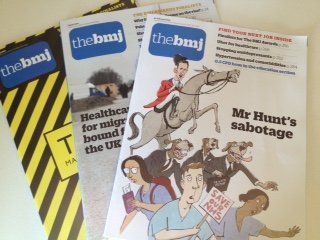
- Journal reading - Obvious, but where most of us begin if only to reduce the mountain of unread journals awaiting our return to work.
- Internal teaching sessions - For employed doctors - If feeling well enough, it is possible to ask if you may attend relevant formal teaching sessions at your place of work.
- External paid for courses - For employed doctors - If your medical advisers agree that you are well enough to undertake some CPD while on long term sick leave, then it may be worth asking your employer if they will consider funding relevant course fees.
- Deanery - Your local deanery may offer a variety of learning opportunities for doctors within the region. If you are on long-term sick leave from an NHS post, you are likely to be able to access some valuable learning sessions for free or at reasonable cost.
- BMA Library The BMA has a full medical library service for members with access to books and journals. Books are posted out to you by the library and returned at your expense. It is also possible to request copies of journal articles. FREE for BMA members
- BMJ learning - Excellent website with hundreds of online modules on clinical and relevant non clinical career development topics. FREE for BMA members.
- BMJ Portfolio can be used to log your BMJ Learning modules as well as other learning experiences. FREE
- Colleges: E-learning - Your college may offer free e-learning modules via their website. N.B. The Royal College of General Practice has some excellent free (for anyone) modules including the e-learning session for the Health for Healthcare Practitioners course.
- Courses & conferences - Colleges may offer a reduced rate for retired members and it is worth asking if you could be treated as retired for the purpose of paying conference fees if you are on a career break due to ill health.
- Medical Protection Society - The MPS offers an excellent series of risk management workshops which are free to members including those with deferred (free) membership. FREE for MPS members.
- Information Technology (IT) training - If you are not working and in receipt of a government benefit such as Jobseeker's Allowance (JSA) or Employment Support Allowance (ESA) you may be able to access relevant IT training without cost. There are many different providers, each with their own specific funding criteria in this field. One example of the type of IT training available is the European Computer Driving Licence ( ECDL ) which is widely recognised by the NHS as a badge of proficiency in the use of software applications such as Microsoft Word, Excel and PowerPoint. The ECDL qualification counts as 40 hours of CPD and, depending on the provider, may often be mainly completed at your convenience, online at home. Your local Jobcentre Plus may be able to provide you with suggestions of appropriate local IT training providers. Alternatively, your local Adult Education service may offer free IT training for benefit claimants. FREE for JSA or ESA claimants
- Tax allowances for CPD expenses - If you are still employed or working as a doctor in some capacity, expenses incurred for CPD events may be allowable against tax. You will need to inform the Inland Revenue of your claim for adjustment of your tax allowance
Updated 2016
The above advice is offered in good faith but it is the reader’s responsibility to assess whether it is appropriate to follow the advice in their own situation. Neither the Doctors' Support Network nor the author can be held responsible for any consequences of following this advice.
